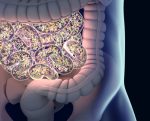Intestinal inflammation markers linked to Parkinson’s risk: Study
High levels of beta-defensin 2, lactoferrin seen as disease predictors
Written by |

Levels of two markers of intestinal inflammation — beta-defensin 2 and lactoferrin — were elevated in the stools of Parkinson’s disease patients when compared with healthy adults, and were associated with a likelihood of developing the disease, a study found.
Calprotectin, a marker of tissue inflammation, wasn’t found to be higher in Parkinson’s patients, but was linked to disease duration and severity of several nonmotor symptoms, including depression and gastrointestinal symptoms.
“Our study provided evidence for intestinal inflammation in PD [Parkinson’s disease], establishing links with age, disease duration, and some nonmotor symptoms,” the researchers wrote in the study, “Association of intestinal inflammation and permeability markers with clinical manifestations of Parkinson’s disease,” which was published in the journal Parkinsonism & Related Disorders.
While the hallmarks of Parkinson’s disease are motor symptoms, patients also may experience nonmotor symptoms such as cognitive impairment, depression, disturbed sleep, and gastrointestinal difficulties.
Inflammation in the intestine and an imbalance of the gut microbiome may contribute to Parkinson’s disease via the gut-brain axis, a communication system between the brain and gastrointestinal organs made through nerve and immune cells.
Calprotectin, zonulin levels higher in Parkinson’s patients
The gut microbiome is the vast community of friendly bacteria, fungi, and viruses that colonize the gastrointestinal tract and help in its function. Its imbalance, known as gut dysbiosis, can damage the intestinal wall, leading to inflammation.
Previous studies have shown that markers of intestinal inflammation can be detected in blood and stool samples. Parkinson’s disease patients have been found to carry elevated levels of calprotectin and zonulin, a marker of intestinal permeability, when compared with healthy people.
Researchers in Croatia analyzed the stools of patients with idiopathic Parkinson’s, meaning the cause of their disease wasn’t known, and healthy adults for markers of inflammation and damage to the intestinal wall to assess how these markers correlated with the severity of both motor and nonmotor symptoms.
The analysis involved 128 participants, 71.1% of whom were men. Half of those, or 64, were Parkinson’s patients, with a median age of 66. Another 64 healthy adults, with a median age of 61, served as a control group.
Beta-defensin 2 and lactoferrin levels were significantly higher in Parkinson’s patients when compared with controls. The same was seen for the intestinal permeability marker zonulin.
Levels of beta-defensin 2 and lactoferrin were significant predictors of risk of developing Parkinson’s.
Predicting disease duration, symptom severity
Higher calprotectin levels correlated with higher levels of motor impairment, as measured by the Movement Disorder Society-Unified Parkinson’s Disease Rating Scale (MDS-UPDRS) part 4 subscale, which assesses motor impairments including motor fluctuations, involuntary movements known as dyskinesias, and involuntary muscle contractions or dystonia.
A positive correlation was also observed between calprotectin levels and disease duration, as well as severity of nonmotor symptoms including gastrointestinal symptoms and depression. Gastrointestinal symptoms were evaluated with the Scales for Outcomes in Parkinson’s Disease-Autonomic (SCOPA-AUT) and the MDS Non-Motor Rating Scale (MDS-NMS).
Levels of beta-defensin 2 showed a positive correlation with thermoregulation, or the process by which organisms regulate their body temperature to maintain it within an optimal range.
Levels of secretory IgA, the most abundant antibody in the intestinal mucosa, showed a negative correlation with patients’ age and age at disease onset. Conversely, a positive correlation was detected between secretory IgA and depression severity. This means lower IgA levels were seen in older patients, and higher IgA pointed to more severe depression.
Lower levels of zonulin corresponded to higher scores on the MDS-UPDRS, indicating more severe motor symptoms.
Since the analysis involved a small number of patients, “we believe that future studies on a larger number of participants are needed to define the clinical subtypes of PD patients in which the inflammatory process on intestinal mucosa contributes to” the development of the disease, the researchers wrote.







